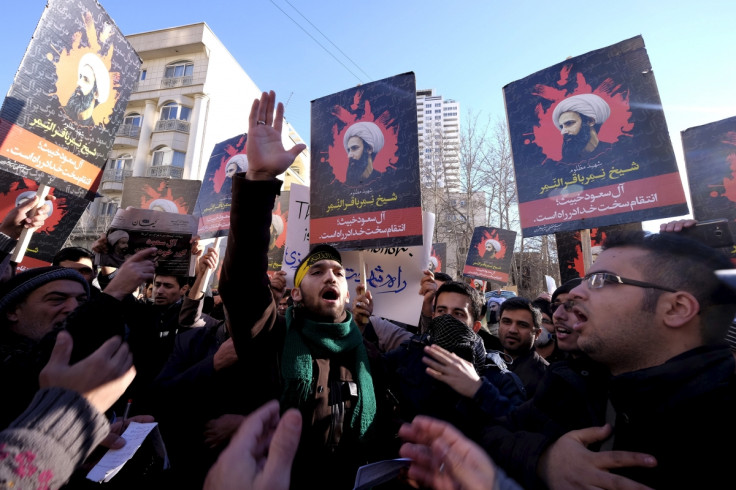British Foreign Office 'expresses disappointment' at mass Saudi Arabia executions

The UK has spoken against Saudi Arabia amid growing international outrage over its mass execution of 47 prisoners. The statement was made by a Foreign Office minister, Tobias Ellwood rather than by Prime Minister David Cameron, who has so far stayed silent on the Gulf state's killing of Shia cleric Nimr al-Nimr and 46 others.
In a carefully worded statement, Ellwood said: "I am deeply disturbed by the escalation in tensions in the last 24 hours in the Middle East. The UK is firmly opposed to the death penalty. We have stressed this to the Saudi authorities and also expressed our disappointment at the mass executions."
In the aftermath of the mass killings, angry protesters stormed and set fire to the Saudi Embassy in Tehran on 2 January. As tensions threatened to spill over on Sunday night (3 December), Riyadh took the decision to sever diplomatic ties with its Shia rival and ordered Iranian diplomatic personnel to leave within 48 hours.
Ellwood said: "We are deeply concerned to hear of the attack yesterday [2 January] on the Saudi Embassy in Tehran. It is essential that diplomatic missions are properly protected and respected. There are those who will wish to exploit the situation and raise sectarian tensions higher. This would be against the wishes of the vast majority of those in the region. I urge all parties in the region to show restraint and responsibility."
The UK is the largest arms supplier to Saudi Arabia and pressure is mounting on Cameron over Britain's relationship with a country with a dismal human rights record. In October last year the prime minister was torn to pieces in a televised interview with Channel 4 News over a secret deal with the oil rich Gulf kingdom to ensure that both countries were elected to the UN Human Rights Council.
Former Lib Dem leader Lord Ashdown expressed alarm at the executions and said they could worsen the conflict between Sunnis and Shias in the volatile region. "These executions are deeply, deeply destabilising to the very delicate situation that exists in the Middle East and the danger of a wider Sunni and Shia conflict. The West, including the UK government, is only just realising the danger of this and its implications for long term peace in the region. It poses a far greater danger in the long term than, for example, Isil [Isis]," he told the Independent.
"The UK Government should be making it explicitly clear that it regards this act as extremely destabilising. These executions are shocking in human rights terms and reveal the real nature of the people with whom we are dealing. The UK's stance underlines its deeply illogical position of ignoring the funding of jihadist groups, including Isil, which is coming from within Saudi Arabia."
Following the execution of the prominent Shia cleric, all eyes will now be on his nephew, Ali Mohammed al-Nimr, who has been sentenced to death for protesting against the Saudi regime despite being just 17-years-old when he was arrested. Now 21-years-old, al-Nimr faces crucifixion.
Ellwood said: "We have discussed with the authorities in Riyadh, and expect that Ali Al-Nimr and others who were convicted as juveniles will not be executed. The UK will continue to raise these cases with the Saudi authorities."
In separate telephone calls with the Iranian and Saudi foreign ministers, EU foreign policy chief Federica Mogherini appealed for calm. "No effort should be spared by all parties to keep the situation under control and to avoid sectarian tensions to escalate," a statement said following her conversation with Iranian Foreign Minister, Javad Zarif. It added: "The security and stability of the whole region, that is already facing great threats, is at stake".
© Copyright IBTimes 2025. All rights reserved.






















